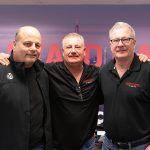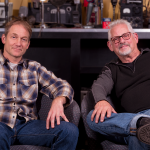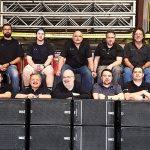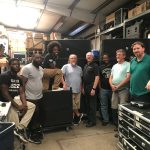Harvest Productions of Kansas City got its start in 1987, incorporated in 1992, and in the nearly two decades since has grown to be one of the most successful and dependable sound/lighting/video companies in their corner of the Midwest. Harvest's founder and president, Ron Davis, is a Kansas City native himself, and likes that his company's name reflects the agrarian roots of the region in which it thrives. "And," he points out, "the company is always growing."
Once a Concert Promoter
A quarter-century ago, there was a Harvest Productions concert promotion business that operated out of Chicago, Minneapolis and Kansas City, "but that company eventually folded-and we stayed and kept the name," Davis says of the K.C. operation. "We quit promoting concerts and did this instead."
"This" was sound reinforcement work. Growing up, Davis had always been technically inclined and in college he started doing some SR work for his roommate's vocal group as a sidelight. "I went to school for business administration, not sound, so it was just a hobby at first," he says. "From there, though, the doors kept opening and that's what I ended up doing. Later, I bought a system because I was working with a little band, and when the band went away I still had the system, and then other opportunities opened up with friends, and then with other groups.
"The first real client outside of that world was the Kansas City Symphony," he continues. "We did a big two-week Christmas event at the downtown music center called the Festival of Light back in the late 1980s, which involved a full orchestra and all these different performances. We didn't actually have enough gear of our own to do that then, but we managed to get what we needed from another company and the people at the Symphony heard it and liked what we did and later came to us to take care of their sound needs. From there, we started doing things at the Starlight Theatre, which is an 8,000-seat amphitheater where they have concerts and musical theater and other things, and they became a good client as well. So, we started out with some good clients and we didn't even pursue them – they came to us, so that was encouraging," he laughs. "We got our start in the fine arts world and we've continued to maintain a lot of those old relationships through the years at the same time as we've expanded into other areas."
A Holistic Approach
Sound for houses of worship became an important area for Harvest, and that was followed by expansion into other fields. As Davis explains, "We've pretty much grown by customers saying, ‘Hey, we need to do this and we want to add this to what we're doing,' and we say, ‘We can do that,' and we'll go hire somebody who specializes in that service and start investing money in some gear. We started with sound, added lighting, and then, eventually, video, and that works really well for all the corporate work we do-we need all those pieces and parts. They like to have one person to talk to about everything." Davis also notes that in the case of the Symphony, what started as a sound-only gig for Harvest now often includes lighting and video, as well.
Davis emphasizes that he has tried to build the company on strong ongoing relationships with clients "where you have a chance to do multiple things, versus chasing the one-off thing coming through town where you get one shot at it and then you might not get another shot at it for a couple of years. It's nice whenever you can really get to know a client well and they get to know our capabilities, as well."
Harvest has been active in Kansas City's dynamic Power & Light District, an eight-block complex of entertainment venues, restaurants and shops, including an outdoor performance space that hosts some 80 events from March through November.
"The main stage has a permanent sound system," Davis offers, "but we have a moving light package in there and also video screens we control the content on. In October [2010] we took over the Convention Center facility here which is a new world for us – it's got a big exhibit hall, a bunch of break-out rooms, several ballrooms, a music hall and municipal arena attached to it, so we're working in all those venues in different capacities."
On the touring front, Harvest has worked extensively with popular Christian artist Michael Card.
After the Storm
Davis says that like most companies Harvest was hit by the recent recession, but he feels that in his market, the economy is on the rebound. "Budgets are definitely coming back up in corporate, in some cases more than double what they were the year before," he says. As for the house of worship end, "They might be a little further behind in the recovery; they're still doing work, but some of the budgets aren't as big as they were."
On the sound equipment side, Harvest has always handled a multiplicity of popular brands for loudspeakers, consoles and processing, though very early on the company developed a relationship with Meyer Sound that continues to this day. "We had Meyer MSL-3s in our beginning rigs," Davis comments, "and though we've also had quite a bit of EAW over the years, it's been mostly Meyer – we're still a Meyer house, with the Milo and the M'elodie and MSL-4s and that kind of stuff. It's a pricier product sometimes, but it works so well, and the different pieces and parts of the smaller cabinets and the larger cabinets work really well together."
Because of all the symphony and theater work Harvest does, Davis says that "we probably have a lot of different microphones than a rock ‘n' roll-oriented company would have. We also have about 100 channels of high-end wireless sets for the musical theater world."
Still Evolving
For many years, Davis himself often mixed sound (both FOH and monitors), but for the last several years he's mostly been tied up just running his ever-expanding company. Harvest currently employs 34 full-time and nearly that many part-time employees to handle the company's many different aspects, and Davis relies on those sound, lighting, video, installation and rigging professionals to stay on top of developments in each of those areas.
"We've continued to change and evolve through the years. We hire who we need to hire and add what we need to equipment-wise and take care of what people need. We've never put any limits on what we'll do.
"Clients come and go," he continues. "Some don't make it, others might get bought and move to another city. That's part of the business and a reason why you have to be flexible, adjusting and fine-tuning what you do."



